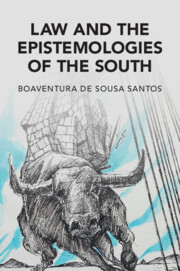Book contents
- Law and the Epistemologies of the South
- CAMBRIDGE STUDIES IN LAW AND SOCIETY
- Law and the Epistemologies of the South
- Copyright page
- Contents
- Preface
- Abbreviations
- Part One The Tragic Optimism of the Law: THE END OF A STORY
- Part Two Epistemologies of the South and the Law
- Part Three The Abyssal Law under the Mode of Abyssal Exclusion
- Eight Lawfare: A Long History
- Nine Colonial Law and Imperial Law
- Ten Colonial Legal Duality: The Creation of Legal Codes for Indigenous Populations
- Part Four Real Legal Utopias: Interrupting the State
- Part Five Real Legal Utopias: Interrupting the Law
- Part Six Real Legal Utopias: Interrupting Hegemonic Human Rights
- References
- Index
- Cambridge Studies in Law and Society
Ten - Colonial Legal Duality: The Creation of Legal Codes for Indigenous Populations
from Part Three - The Abyssal Law under the Mode of Abyssal Exclusion
Published online by Cambridge University Press: 07 August 2023
- Law and the Epistemologies of the South
- CAMBRIDGE STUDIES IN LAW AND SOCIETY
- Law and the Epistemologies of the South
- Copyright page
- Contents
- Preface
- Abbreviations
- Part One The Tragic Optimism of the Law: THE END OF A STORY
- Part Two Epistemologies of the South and the Law
- Part Three The Abyssal Law under the Mode of Abyssal Exclusion
- Eight Lawfare: A Long History
- Nine Colonial Law and Imperial Law
- Ten Colonial Legal Duality: The Creation of Legal Codes for Indigenous Populations
- Part Four Real Legal Utopias: Interrupting the State
- Part Five Real Legal Utopias: Interrupting the Law
- Part Six Real Legal Utopias: Interrupting Hegemonic Human Rights
- References
- Index
- Cambridge Studies in Law and Society
Summary
In the following chapters, I analyse several attempts to interrupt the abyssal nature of the modern state emerging from my previous research on sociology of law. I try to identify the reasons why most of such attempts failed. In this chapter, I analyse some of the most salient features of the state and the legal system in Mozambique proposing the concept of heterogeneous state to highlight the breakdown of the modern equation between the unity of the state and the unity of its legal and administrative operation. The centrality of legal pluralism is analysed in light of an empirical research focused on community courts and traditional authorities. I use the concept of legal hybridisation with the purpose of showing the porosity of the boundaries of the different legal orders and cultures in Mozambique and the deep cross-fertilisations or cross-contaminations among them. Special attention is given to the multicultural plurality resulting from the interaction between modern law and traditional law, the latter conceived of as an alternative modernity.
Keywords
- Type
- Chapter
- Information
- Law and the Epistemologies of the South , pp. 269 - 292Publisher: Cambridge University PressPrint publication year: 2023

